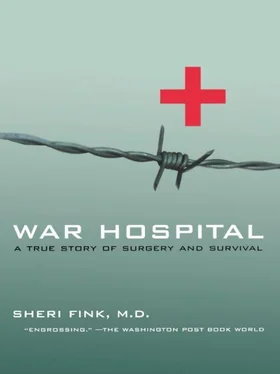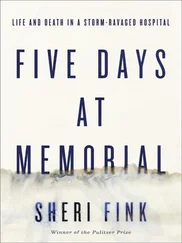MSF unpublished documents: Press Release, Doctors Without Borders, New York/Paris, January 31, 2003: “Dutch inquiry fails to answer key questions into Srebrenica Massacre: MSF calls for the US and the UK to carry out investigations.” Doctors Without Borders, November 11, 2000, “Why MSF is calling for a parliamentary commission on Srebrenica.” Doctors Without Borders briefing document, November 2001, “Parliamentary hearings on Srebrenica: the arguments, omissions and contradictions.”
U.N. Srebrenica Report, sections: 486 (question of countries possessing advance knowledge about the attack on Srebrenica), 501 (call for U.N. member states to examine their responsibility for Srebrenica by their “prolonged refusal to use force in the early stages of the war”).
Asemblée Nationale (France), November 22, 2001, “Report by the Parliamentary Committee on the events in Srebrenica: Conclusion.”
Asemblée Nationale (France), November 22, 2001, #3413, “Rapport d’information dépose en application de l’article 145 du Règlement: Par la mission d’information commune sur les événements de Srebrenica,” pp. 183–192.
Dutch Parliament, January 27, 2003, the Hague, “Introduction by the Chairman of the Committee of Inquiry into Srebrenica at the presentation of the final report, ‘Missie Zonder Vrede’—‘A Mission Without Peace.’”
International Commission for Missing Persons, “Tracking Chart for Srebrenica Cases as of July 2 (2004).”
Other Materials
Information on those indicted and arrested comes from the International Criminal Tribunal for the former Yugoslavia website: www.un.org/icty accessed July 9, 2004.
Photographs released by the United States government showing land disturbances near Srebrenica in July 1995 suggestive of mass graves.
Notes
PAGE 340 The last week of August… After more than a year of lobbying by the American Committee to Save Bosnia (a coalition of grassroots and national organizations) and the Action Council for Peace in the Balkans (composed of prominent citizens) led by State Department resignees Stephen Walker and Marshall Harris, both houses of the U.S. Congress passed, by veto-proof margins, legislation to lift the arms embargo on Bosnia. The Senate vote immediately followed the fall of Srebrenica, and several previously undecided Senators cited it as a major reason for their affirmative votes. According to Walker, “If lifting the embargo worked, Clinton’s responsibility for facilitating genocide—and (Senate majority leader Bob) Dole’s leadership in ending it—would stand in stark contrast in the election.”
PAGE 340 By the time that international leaders… Some analysts suggest that it was Clinton’s election-year political need to conclude a quick peace deal with Serbian President Slobodan Milošević that led him to halt the Croatians and Bosnians at the moment they had command of roughly the amount of territory allotted to them in the latest “Contact Group” peace plan.
PAGE 347 Dutch officers argued… Radio Netherlands , November 19, 2002, by Marina Brouwer. www.nrw.nl/hotspots/html/sre021119.html (accessed November 20, 2002).
PAGE 347 As just one example… This is a four-page document marked “secret” to P-Mr. Kantor from INR-Douglas P. Mulholland. Subject: Bosnia: Actions contributing to genocide. United States Department of State. January 11, 1993.
PAGE 350 On another topic… Even the International Committee of the Red Cross, which guards its humanitarian neutrality extremely closely out of a belief that this allows it to function on all sides of every war, broke its characteristic silence and repeatedly denounced violations of humanitarian law in Bosnia—condemning such violations should in no way be considered a violation of humanitarian neutrality.
PAGE 350 There are times when the higher moral duty… Some analysts have called for the creation of “physician-diplomats,” trained in both medicine and international relations.
PAGES 351–352 In the case of Bosnia, however… Military involvement in humanitarian action is itself a controversial subject, and events in Srebrenica illustrate some of its problems as well as its benefits. Dutchbat medical teams became involved in medical assistance to the Srebrenica population out of a genuine desire to help at a time when they had abundant resources and helping the population improved the standing of Dutchbat. However, because provision of humanitarian assistance wasn’t Dutchbat’s main aim, it withdrew that assistance when other priorities took precedence. In the meantime Srebrenicans and even MSF in Srebrenica had become dependent on this medical assistance. In the spring of 2003, the fear of dependence on temporary military medical aid was raised in Iraq when U.S. marines set up temporary field hospitals in parallel with the regular health system as part, according to several of those involved, of a “hearts and minds” campaign to improve their standing with the local population.
PAGE 352 In the spring of 2003… However, it could be argued that the “occupying powers” were trying to meet that responsibility, in part, by funding non-governmental humanitarian aid agencies to do the work in which they, not the military, excel.
PAGE 352 Finally, the shining example of a doctor… This must be said of many of the Srebrenica doctors, too, including Ejub Alić, Fatima Dautbašić, and Nijaz Džanić among others. Eric Dachy, though he held passionate beliefs about the war, consistently acted as a neutral humanitarian, bringing assistance to all who needed it, regardless of their nationality.
PAGE 356 “Srebrenica has only strengthened my resolve and my motivation…” Ins and Outs, November/December 1995, by Malou Nozemann. Volume 9, #7. Interview with Christina Schmitz entitled “We can’t remain silent and just do our medical work.”
Aeberhard, Patrick. “A Historical Survey of Humanitarian Action.” Health and Human Rights. Vol. 2 No. 1, 1996, pp. 30–45.
Anić, Nikola, et al. Sanitetska Sluzba u Narodno Oslobodinačkom Ratu Jugoslavije 1941–1945 . Belgrade: Vojnoizdavački i novinski centar, 1989.
Armstrong, Gail, and Patricia Forestier. “Ending the Balkan Nightmare.” Freedom , Volume 31, Issue 2 (year unknown).
Barry, Jane, with Anna Jefferys. “A Bridge Too Far: Aid Agencies and the Military in Humanitarian Response.” Humanitarian Practice Network Paper , Number 37, 2002.
Beauchamp, Tom, and James F. Childress. Principles of Biomedical Ethics, Fourth Edition. New York: Oxford University Press, 1994.
Bellamy, Ronald, and Russ Zajtchuk (eds.). Conventional Warfare: Ballistic, Blast and Burn Injuries. Washington, D.C.: Office of the Surgeon General, 1991.
Berger, Jean-François. The Humanitarian Diplomacy of the ICRC and the Conflict in Croatia (1991–1992). Geneva: International Committee of the Red Cross, 1995.
Bosnia Country Handbook. Washington, D.C.: United States Department of Defense and Peace Stabilization Force (SFOR), 1997.
Bosnia: Echoes from an Endangered World—Music and Chant of the Bosnian Muslims. Compact disc. Smithsonian Folkways, SF-40407, 1993.
Bouchet-Saulnier, Françoise. “Peacekeeping Operations Above Humanitarian Law.” In François Jean, ed., Life, Death and Aid: The Médecins Sans Frontières Report on World Crisis Intervention . New York: Routledge, 1993, pp. 125–130.
———. The Practical Guide to Humanitarian Law. Lanham, Md.: Rowman and Littlefield, 2002.
Brauman, Rony. “When Suffering Makes a Good Story.” In François Jean, ed., Life, Death and Aid: The Médecins Sans Frontières Report on World Crisis Intervention . New York : Routledge, 1993, pp. 149–158.
Читать дальше












